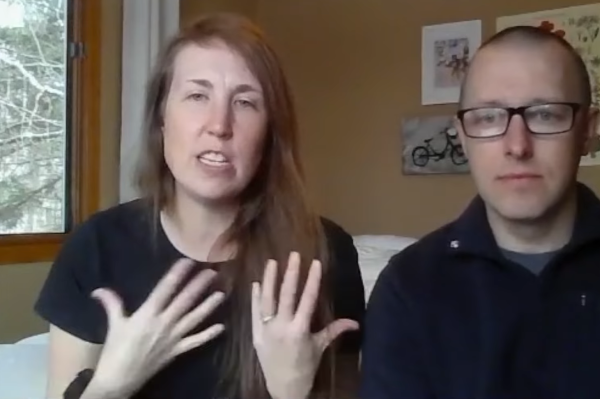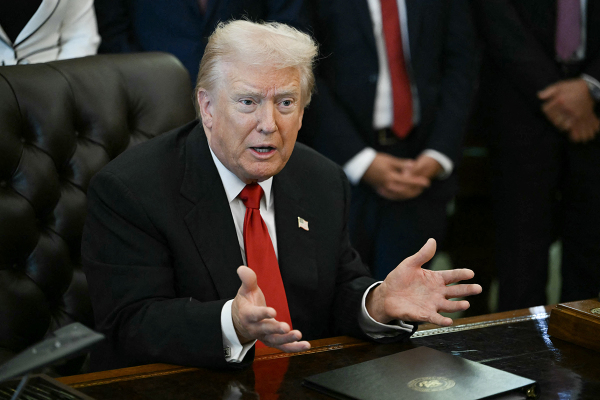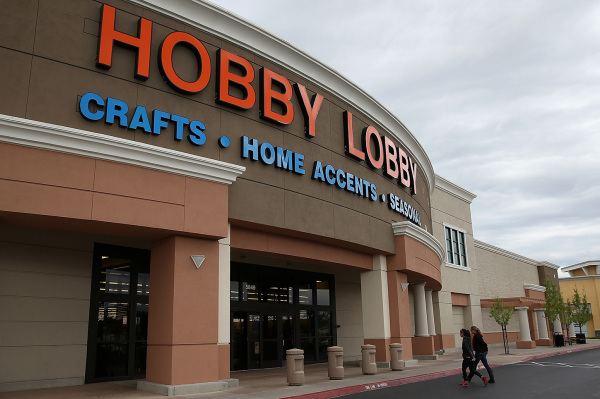Interview: Two Christians Say It's Better Not to be Emergent
"I am a pastor. And I am not emergent," writes Kevin DeYoung, pastor of University Reformed Church in East Lansing, Mich., at the beginning of Why We're Not Emergent (By Two Guys Who Should Be).
DeYoung and co-author Ted Kluck, a member of the Reformed church, have just released a book that offers Christians both a theological and "on-the-street" perspective on the emerging church. While cautioning against the more liberal end of the emerging church movement, the authors also show how they've come to embrace their more traditional evangelical roots and most importantly, the truths about Jesus and Scripture.
These two 30-somethings have not joined the emergent scene, but many young Christians have as they rebel against the "religious right" and adopt an it's-all-relative attitude. And what the authors want to present is that you can be passionate about Jesus Christ and not be emergent, and the evangelical church is not as dire as emergent Christians might lead you to think.
Questions for Kluck
CP: What qualities make you emergent or what is it about you and your church that should place you in the emergent category?
Kluck: It was one of those titles that is a little bit playful. We're not emergent obviously. "By Two Guys Who Should Be" sort of refers to our demographic. I think reading a lot of this emergent literature and going to some emergent services, we really realized that this movement mostly targeted at guys like this – white, suburban, yuppies, 30-something, college-educated guys. For a movement that I guess promises this unchecked creativity and diversity, what we found was in fact a not very diverse population. "By Two Guys Who Should Be" refers to at least on paper, we hit that demographic.
CP: How did the idea for the book come about with your pastor?
Kluck: For us, I think it happened like it happens for a lot of people in the emergent church in that a few years ago, these books were being passed around our congregation – Brian McLaren's A New Kind of Christian, Rob Bell's Velvit Elvis, these kind of landmark emergent texts. I was reading them with an open mind – "hey, what can we learn from this? What are you guys all about?" At the end of the day, I think a number of theological red flags became apparent even to a guy like myself with no theological training. Kevin and I just realized it might be helpful to have a book in this conversation that was written by younger guys, in a more readable man-on-the-street presentation. I think the only book at that time that was out kind of as a caution to the emergent church would be D.A. Carson's Becoming Conversant with the Emerging Church which is a really good book but it's a really tough read. It's pretty Ph.D-ish.
CP: Can you describe your own personal journey from being dissatisfied or disillusioned with the church you grew up in, experimenting with the emergent church movement, and ultimately going back to your traditional church? What did you conclude about the emerging church movement?
Kluck: I grew up in a Christian home, in the Midwest, a conservative Christian area. I went to Taylor University which is a Christian college. I think the emergent church really resonates with kids like myself who've been in the Christian "bubble" their whole life. I think for kids like that, the sexiness, the rebellion of the emergent church is attractive. Any time you're in an institution for that long, you self critique it and that could be healthy. I think when I was reading a lot of these emergent texts, I felt they're right – the evangelical church doesn't seem to care about the poor, doesn't seem to care about social justice. A lot of what they wrote in those areas really resonated with me.
Now … I was coming to realize just the importance of doctrine, importance of what is the Gospel, how can I really articulate what I believe, the Gospel has to be more than living like Jesus or social outreach. It has to involve Christ paying the penalty for our sins. In that sense I was really starting to appreciate our church's solid teaching on that. I was also realizing that our church was a lot more diverse than I gave it credit for. A lot of people in our congregation doing a lot of social outreach and social justice type stuff that I think I hadn't give them credit for in the past. Questioning the emergent movement allowed me to appreciate my church.
CP: You described in the book about a time your friend offered you an opportunity to create a church together and then at some point you decided not to continue with it. Can you describe that moment why you decided not to go with that?
Kluck: I didn't want to give up all that I had at our church – really solid biblical teaching, a gospel-centered approach to ministry, the diversity of families and people I've become friends with, older friends and young friends – to give that up and do church in a living room with four couples that looked and sounded a lot like us was not appealing.
The emergent church is big on breaking down the pastor-flock relationship in favor of just an ongoing conversation between people. Something I really always appreciated about church is the pastor-flock relationship. I've been fortunate to have had some really good pastors in my life and men who have studied the scriptures and studied a lot more than I have. I realized those are the kind of people I want to be learning from and that's not to say conversation and questioning can't be good but I just didn't want conversation to be where my family and I ended up church-wise for a long time. I don't have a problem with the different ways emergent folks want to do church but it wasn't where I saw us landing long-term.
CP: You said you knew what you were against – "the evangelical cheesiness" – but didn't have a clue what you were for. Do you find many people today in that same state? Just a bunch of people rebelling against organized religion but not really knowing where to go from there?
Kluck: I think that's where a lot of the emergent church is at. They're against the religious right, all those bad pictures of Christianity that they've seen. But I don't think they know what they're for. They just know they're against that. part of what we wanted to illustrated in why we're not emergent, we really wanted that book to be an encouragement for local church pastors who maybe don't refer to themselves as futurists or revolutionaries or transformational change architects but just do good solid gospel-centered ministry and outreach in their communities. And I think there are a lot of churches like that. It really gave me the hope and the encouragement that wow, evangelical church isn't as dire as the emergent authors would like you to think.
CP: You say you need truth, you need to know Christ died and rose again and that decisions can be made based on Scripture. Many people today also show a desire to know truth but they seem to think it's impossible to know it so they have this "it's all relative" attitude. Why do you think they've come to that conclusion?
Kluck: I think they've come to that conclusion because it's easier to come to that conclusion. If there's no truth, then there's no demands on how we live, what we do with our time, how do we honor God, how do we grow in holiness and sanctification. If there's no truth, we can't handle the authority of Scripture, then really everything's negotiable. Culturally, I think that's a message that the culture likes to hear because it takes away in a sense the Gospel, the cross and it doesn't make any demands of our character.
CP: You indicated this in your book, but do you feel there's an over generalization of people groups such as evangelicals not caring about the poor and pushing right wing politics as you mentioned and also on the emergent side, that they all listen to U2 and reject absolute truth?
Kluck: I suppose there is. We really tried our best to read and interact of emergent as we could for this book so that we could avoid over generalizing ourselves. I think hopefully something else you come away with from the book is that we're not a spectrum. Not everyone who calls themselves emergent is throwing out the authority of Scirpture, the atonement, the existence of hell or all these core theological issues. I mean some are but there's a broad spectrum and a lot of guys like Mark Driscoll and Dan Kimball are just changing the way they do church to reach postmoderns which I think is essentially fine as long as the Gospel is there. We didn't want to make the same mistake in terms of broad generalization.
CP: You and Pastor Kevin stressed several times in the book that you're writing this critique of the emergent church as Christians and you want to do it lovingly. Why was it so important for you to emphasize that, because of the countless debates and arguments going on about the postmodern churches?
Kluck: Yeah, and I really hate that. I really feel like I was probably the last guy who would ever write a book like this just because I hate the Internet message board debates and I really saw myself writing a controversial book. In a sense I think it's just because of our personalities but also I think there's something unique about Christians critiquing or challenging other Christians. There's definitely biblical precedent for that but I think it needs to be done in a humble and loving way. That was our goal. We probably failed at times but that was definitely what we shot for.
CP: When I look at the younger generation of believers I see a side that's rejecting the all things traditional about the church but also a side that's trying to get back the traditions, the doctrine and Scripture. How do you view it?
Kluck: I agree with you. We definitely see it in our church. A lot of it again has to do with context. Where we're at physically here in East Lansing, we're literally across the street from Michigan State which is a big secular university. It seems like the kids that come to URC (University Reformed Church) from State they really don't want postmodernism. They get liberal, postmodern thought five days a week in their classroom. It's not necessarily exciting for them to look for that in a church. They really want traditional, they want hymns that have a theology behind them, they want expositional preaching from the pulpit. So I really do think, just anecdotally where we are, we see that.
CP: What do you want to really highlight from your writings in the book?
Kluck: Encouragement for local churches that are faithfully preaching the Gospel that don't get written about because I think there are a lot of them.
_______
Questions for DeYoung
CP: You note that emergent Christians will say that no one speaks for the emerging movement and that no one speaks for anyone else in that movement. Is that why nobody can really define emergent and those who try to have such trouble defining it?
DeYoung: That's certainly one of the reasons. They like to call it a conversation. The nature of a conversation is more ambiguous, anamorphis, and when their statement of faith for emergent village says they don't believe in statements of faith that makes it very difficult to [identify] what are these folks really about? I think there's enough overlapping themes to try to speak of it as a movement but because it's a conversation, because emergent by definition doesn't want to be codified, they don't like systematic theology, it becomes very difficult to say "here's this group of people and they believe this thing."
CP: You did suggest that emergent leaders write up a statement identifying what they believe. I see the need for that, but even evangelicals these days seem to be having a problem with writing statements to identify themselves – like the evangelical manifesto that recently came out. Do you think Christians overall are having problems identifying Christianity and how do you feel statements of faith can be effective for the emerging church?
DeYoung: Certainly there's a lot of difficulty with definition in what is an evangelical and even what is a Christian and is it to be doctrinally defined. I don't expect that the emerging leaders are going to read our book and say "I guess we better drop a statement." But they seem to revel in ambiguity and slippery, in my opinion, on a number of core issues. They admit to that in some of their books – "You think we're being evasive? Well, we are. So we're not going to tell exactly what we believe about hell or what we believe about inclusivism vs. exclusivism and the uniqueness of Christ. We're not going to weigh in on these debates about the inerrancy of Scripture or we're not going to make a pronouncement about homosexuality." Now I understand that people can be confused and we all have issues that we don't quite understand but these are some pretty key issues and if you're key leaders and teachers, whether that's what you want to call yourself or not, it seems to me that it would be wise and helpful for the church to speak with more clarity on some of these issues.
CP: And doesn't the younger generation want that kind of clarity especially when there's all this ongoing debate on moral issues?
DeYoung: My experience is that you're right. Young people do want that. We're right across the street from Michigan State University. And at least the students we come in contact with, they're tired of getting the response of squishiness in their classes. They want to know "What do you believe?" Even people in our church doesn't believe in every single thing that I believe or preach but I think for the most part, if you can do it in a way that's gracious and winsome, they'll appreciate it and say "Well, at least know what this guy thinks and I know where he stands on this issue." I think there's a way to be clear and dogmatic that isn't unnecessarily offensive and harsh to people. Just say "Hey, here's what we believe, here's where we stand. What do you think?" And we'll still love each other.
CP: In the book, you say that the more you learn about the emergent church, the harder it is to swallow. What's most difficult of the movement to swallow?
DeYoung: I'll just mention two or three. Probably most difficult is the emergent view of the Gospel. There are more and more books coming out like this that explain the Gospel without putting at the center of it the substitutionary atonement for our sins on the cross. So the Gospel becomes this message about a broken world and Jesus as the great example, he died on the cross as an example of suffering for what he believed in and showing how to overcome evil in our own life and evil in the world; here's an invitation to follow Jesus and bring about this new world and this shalom. That sounds like a great message but it's missing the offense of the cross, it's missing the fact that we can't obey God's commands, we need a savior, substitute for our sins. So I see an emergent Gospel that is more law than Gospel, it's more imperative about what we need to do and not first of all indicative statements of what God has done for us.
One other concern I have is the emergent view of knowledge. They've taken the postmodern view of knowledge that God is so infinite and so beyond us that to put Him in human words or to describe Him in human language is by its very nature heretical. That sounds humble but it undercuts God's ability to reveal Himself in the Scriptures – that He is always a god who wants to speak to us, who wants to reveal Himself to us. Now, absolutely we cannot understand God exhaustively but God is sovereign, God is good, God wants to go public with His glory. So He has explained to us in the Scripture, through Jesus Christ what He's like and we can know it.
CP: You talk about the role of a pastor in the book. Ted had mentioned that he actually appreciates the pastor flock relationship and he came to realize that after experiencing the emergent church and how the pastor is actually more on a conversational level with the attendants. Where does the emergent church go wrong on the pastor role?
DeYoung: My concern is some of the emergent leaders have said that our new model of leadership is Dorothy from the Wizard of Oz. She's a woman, she's lost and she's confused, she's a fellow traveler. I'm all for pastors being authentic, real and not trying to be up on a pedestal. But biblical language is still a pastor, a shepherd under shepherds who are governing and caring for and tending this flock. That imagery is there for a reason. The shepherd-sheep imagery is all throughout the Old and the New Testament, not only God with His people but God's appointed leaders with His people. I think there needs to be times in the church for facilitation and conversation but there also needs to be times for heralding, that's Paul's word for preaching, where you declare a message. It's not just a conversation, it's a pronouncement.
CP: What's the one thing you'd like to highlight for believers from the book?
DeYoung: We end the book by talking about the seven letters to the seven churches in Revelation. What I think the church needs to recover is … a fully orbed view of what church is supposed to be. You look at those seven letters and they're all similar in that Jesus commends the churches for some things and then he's critical of some other things. And the emergents have been good at pointing out Ephesus' faults – that's the first church. They had good doctrine, they had good ethics, they worked hard but they didn't love each other. The emergent church says "there are churches in America that don't love, don't care about the lost, don't care about loving the poor." That's a good critique but what they tend to do is ignore all the things Jesus commended of that same church – that they were intolerant or err, that they hated the things Jesus hated. You don't hear the emergent church talking about Jesus hating or Jesus intolerant.
I think we need a view, to look at all the seven churches in Revelation. What are their weaknesses, what are their strength. We need to have a bigger view of the church that's more than just kingdom talk and inclusion and welcome. It's got edges, it's got doctrine, has truth and delineates between falsehood. We really need a church that reflects the whole character of God – God who is truth and grace; God who is holy and kind; tender and sovereign. We need a church that reflects God in all of His diverse excellencies and not a lopsided church.





















